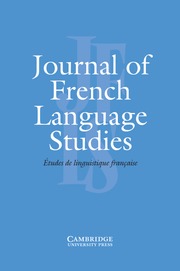Crossref Citations
This article has been cited by the following publications. This list is generated based on data provided by
Crossref.
Vigouroux, Cécile B.
2013.
Francophonie.
Annual Review of Anthropology,
Vol. 42,
Issue. 1,
p.
379.
Hall, Damien
2017.
The Handbook of Dialectology.
p.
474.
Guertin, Monelle
2018.
Variation sociophonétique dialectale et stylistique : quelle est la langue cible en français langue seconde à Montréal ?1.
Arborescences,
p.
67.
SECOVA, MARIA
GARDNER-CHLOROS, PENELOPE
and
ATANGANA, FRÉDÉRIQUE
2018.
‘Il parle normal, il parle comme nous’: self-reported usage and attitudes in a banlieue.
Journal of French Language Studies,
Vol. 28,
Issue. 2,
p.
235.
Beaulieu, Suzie
French, Leif
and
Gagnon, Samuel
2018.
I’veulent-tu parler comme nous-autres ? Opinions d’apprenants sur la forme interrogative totale en français laurentien.
Arborescences,
p.
90.
Blondeau, Hélène
2018.
Pratiques langagières à Montréal et à Bruxelles : diversité et dualité linguistique.
Revue française de linguistique appliquée,
Vol. Vol. XXIII,
Issue. 2,
p.
73.
LINDBERG, RACHAEL
and
TROFIMOVICH, PAVEL
2020.
Second Language Learners’ Attitudes Toward French Varieties: The Roles of Learning Experience and Social Networks.
The Modern Language Journal,
Vol. 104,
Issue. 4,
p.
822.
Oakes, Leigh
and
Peled, Yael
2021.
Pluricentric linguistic justice in Quebec.
Language Problems and Language Planning,
Vol. 45,
Issue. 3,
p.
331.
Mauchand, Maël
and
Pell, Marc D.
2021.
Emotivity in the Voice: Prosodic, Lexical, and Cultural Appraisal of Complaining Speech.
Frontiers in Psychology,
Vol. 11,
Issue. ,
Mauchand, Maël
and
Pell, Marc D.
2022.
Listen to my feelings! How prosody and accent drive the empathic relevance of complaining speech.
Neuropsychologia,
Vol. 175,
Issue. ,
p.
108356.
Hideg, Ivona
Shen, Winny
and
Hancock, Samantha
2022.
What is that I hear? An interdisciplinary review and research agenda for non‐native accents in the workplace.
Journal of Organizational Behavior,
Vol. 43,
Issue. 2,
p.
214.
Masson, Mimi
Kunnas, Marika
Boreland, Taylor
and
Prasad, Gail
2022.
Developing an Anti-Biased, Anti-Racist Stance in Second Language Teacher Education Programs.
The Canadian Modern Language Review,
Vol. 78,
Issue. 4,
p.
385.
Masson, Mimi
Kunnas, Marika
Boreland, Taylor
and
Prasad, Gail
2022.
Developing an Anti-Biased, Anti-Racist Stance in Second Language Teacher Education Programs.
The Canadian Modern Language Review,
Vol. 78,
Issue. 4,
p.
385.
Kircher, Ruth
2022.
Intergenerational language transmission in Quebec: patterns and predictors in the light of provincial language planning.
International Journal of Bilingual Education and Bilingualism,
Vol. 25,
Issue. 2,
p.
418.
Bouchard, Marie-Eve
2023.
The Hierarchization of French Varieties in an English-Dominant Context of Canada.
The Canadian Modern Language Review,
Vol. 79,
Issue. 4,
p.
322.
Rodrigo-Tamarit, Maria
and
Loureiro-Rodríguez, Verónica
2023.
Exploring attitudes towards French, English, and code-switching in Manitoba (Canada).
International Journal of Bilingual Education and Bilingualism,
p.
1.
Mauchand, Maël
and
Pell, Marc D.
2023.
Complain like you mean it! How prosody conveys suffering even about innocuous events.
Brain and Language,
Vol. 244,
Issue. ,
p.
105305.
Bouchard, Marie-Eve
2023.
Examining language and racial attitudes in an L2 French learning context.
Journal of Multilingual and Multicultural Development,
p.
1.
Tekin, Oguzhan
and
Trofimovich, Pavel
2023.
En français or in English? Examining Perceived Social Roles of International Students in Response to Their French and English Speech.
The Canadian Modern Language Review,
Vol. 79,
Issue. 3,
p.
204.




